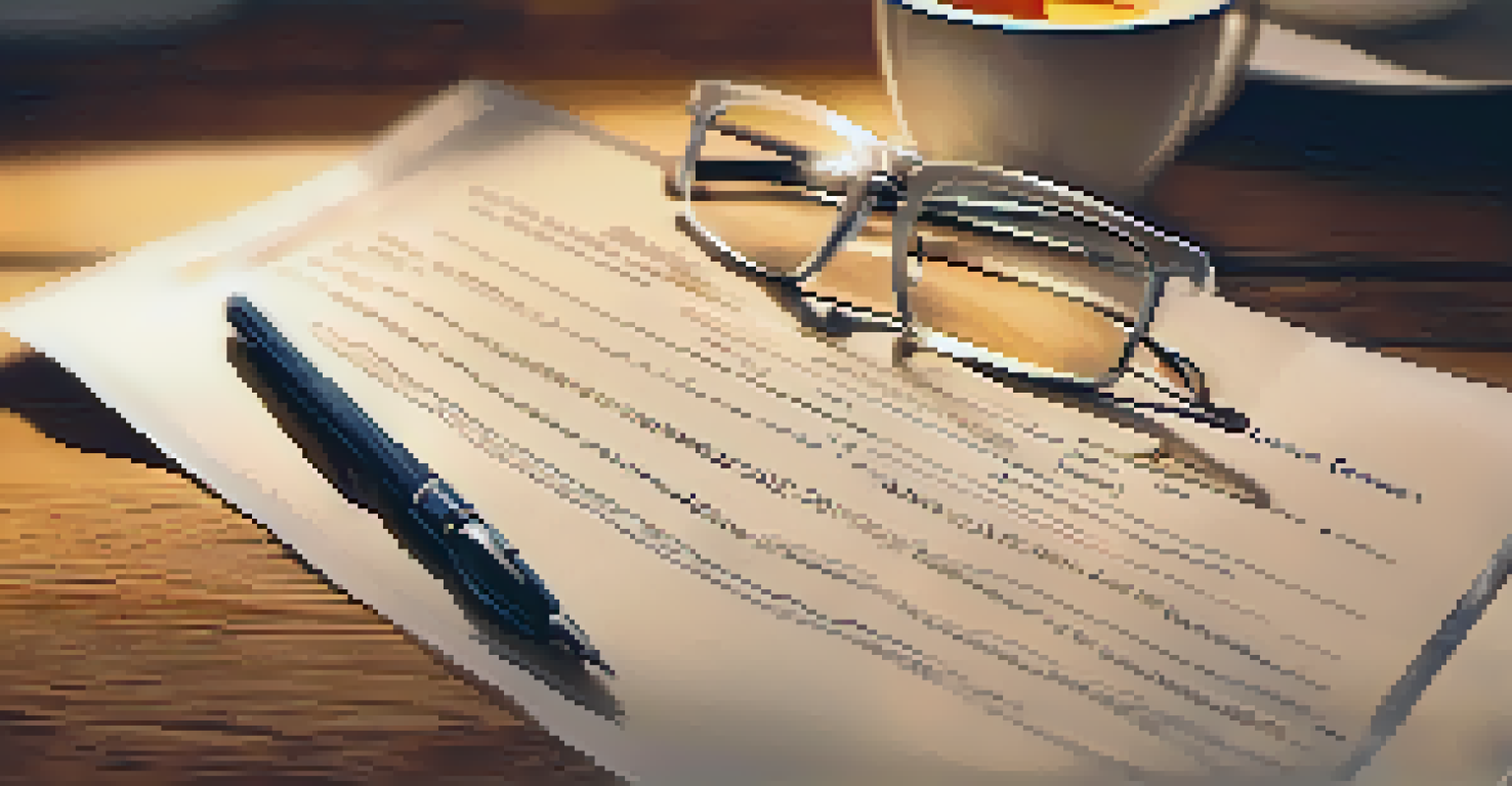Understanding Lease Agreements: Key Points to Consider

What is a Lease Agreement and Why It Matters
A lease agreement is a legally binding contract between a landlord and a tenant. It outlines the terms under which a tenant can occupy a property, including rent amount, duration, and responsibilities. Understanding this document is crucial because it protects both parties and clarifies expectations.
A lease agreement is not just a piece of paper; it is a commitment that can significantly impact your living situation.
Without a clear lease, misunderstandings can arise, leading to disputes or even legal issues. For instance, if a tenant believes they have the right to sublet but the lease states otherwise, it could create conflict. Therefore, knowing what a lease entails is the first step toward a positive renting experience.
In essence, a lease agreement serves as a roadmap for the rental relationship. It lays down the rules of engagement, ensuring that everyone is on the same page right from the start.
Key Terms to Look for in a Lease Agreement
When reviewing a lease, certain terms are crucial to understand. These include the lease duration, monthly rent, security deposit requirements, and maintenance responsibilities. Each of these elements plays a significant role in your rental experience, so take the time to read them closely.

For instance, knowing whether your lease is month-to-month or for a fixed term can affect your stability in the home. A month-to-month lease offers flexibility, while a fixed-term lease provides security for a longer period. Make sure to clarify these terms to avoid surprises later on.
Importance of Lease Agreements
A lease agreement clarifies expectations and protects both landlords and tenants, preventing potential disputes.
Additionally, pay attention to clauses related to the use of the property, such as pet policies or noise restrictions. Understanding these details can help set the tone for your living environment and ensure compatibility with your lifestyle.
Understanding Rent and Payment Terms
The rent amount and payment terms are at the heart of any lease agreement. You should clearly understand when rent is due, acceptable payment methods, and any late fees that may apply. This knowledge helps in planning your finances effectively each month.
Contracts are like marriage. They are only as good as the parties who enter into them.
For example, if rent is due on the first of each month but you receive your paycheck on the fifth, you might face late fees. Ensuring a clear alignment between your payment schedule and the lease can save you unnecessary stress.
It's also important to know what happens if you need to break the lease early. Some agreements include penalties for early termination, while others may offer more flexible options. Clarifying these points upfront can prevent headaches down the road.
Security Deposits: What to Expect
Security deposits are a common feature of lease agreements, acting as a safety net for landlords against potential damages. Typically, this amount is one month's rent, but it can vary. Understanding the purpose and conditions surrounding this deposit is vital for tenants.
Before you sign the lease, ask about the conditions under which the deposit is refundable. For instance, normal wear and tear might not affect your deposit, but significant damage could. Knowing these details helps you take good care of the property and avoid losing your deposit when moving out.
Key Terms in Lease Agreements
Understanding crucial lease terms like duration, rent, and maintenance responsibilities is essential for a positive renting experience.
Make sure to document the condition of the property before moving in. Taking photos can serve as proof of the state of the unit when you leave, making it easier to dispute any unfair deductions from your deposit later.
Maintenance Responsibilities: Who Does What?
Maintenance responsibilities can often be a grey area in lease agreements. Typically, landlords are responsible for major repairs, while tenants handle minor upkeep. However, this division can vary greatly depending on the lease, so it's essential to clarify who is responsible for what.
For example, if the heating system fails in the winter, knowing who is responsible for repairs can save time and frustration. A well-defined lease will specify which repairs fall under the landlord's duties and which are the tenant's responsibility.
Additionally, it’s wise to inquire about the process for reporting maintenance issues. Understanding how quickly repairs will be addressed can greatly affect your comfort in the rental unit.
Termination Clauses: Know Your Rights
Termination clauses outline the conditions under which either party can end the lease. It’s crucial to understand these terms to avoid being locked into an agreement longer than desired. Look for details on notice periods and acceptable reasons for termination.
For instance, if you need to move due to a job change, knowing how much notice you must give can be a game changer. Some leases may allow for early termination under specific circumstances, while others don't, leading to potential penalties.
Navigating Lease Renewals
Familiarizing yourself with lease renewal processes can help you avoid confusion and make informed decisions about your living situation.
Additionally, be aware of what happens at the end of the lease. Will it automatically renew, or will you need to sign a new agreement? Clear termination terms ensure that you're not caught off guard when it's time to make a move.
Understanding Lease Renewals: What to Expect
Lease renewals often come with their own set of rules and expectations. Understanding how the renewal process works can help you avoid confusion when your lease term is nearing its end. Some leases may automatically renew unless you provide notice, while others may require renegotiation.
For example, if your landlord plans to raise the rent upon renewal, knowing this in advance can help you decide whether to stay or seek a new place. It’s a good idea to discuss potential changes with your landlord well before the renewal date.

Being proactive about lease renewals can also strengthen your relationship with your landlord. Open communication about your plans can lead to a smoother transition, whether you decide to renew or move on.
Final Thoughts: Navigating Lease Agreements with Confidence
Navigating lease agreements can seem daunting, but understanding the key components makes it manageable. By familiarizing yourself with the terms and conditions, you'll be better equipped to handle your rental experience. This knowledge empowers you to make informed decisions and protect your rights as a tenant.
Remember, a lease is not just a formality; it’s a commitment that can significantly impact your living situation. Take the time to ask questions and seek clarification on any points that seem unclear. Being proactive can save you from potential pitfalls.
Ultimately, understanding your lease agreement is about ensuring a positive rental experience. With the right information, you can approach your lease with confidence and enjoy your home to the fullest.